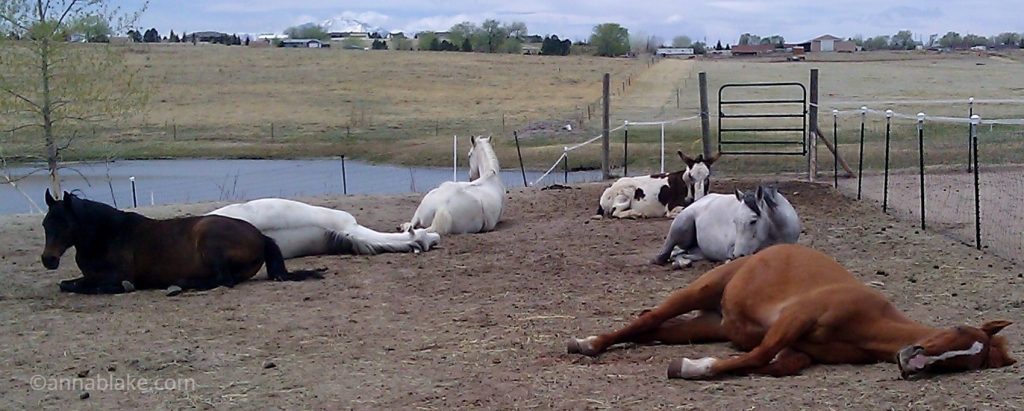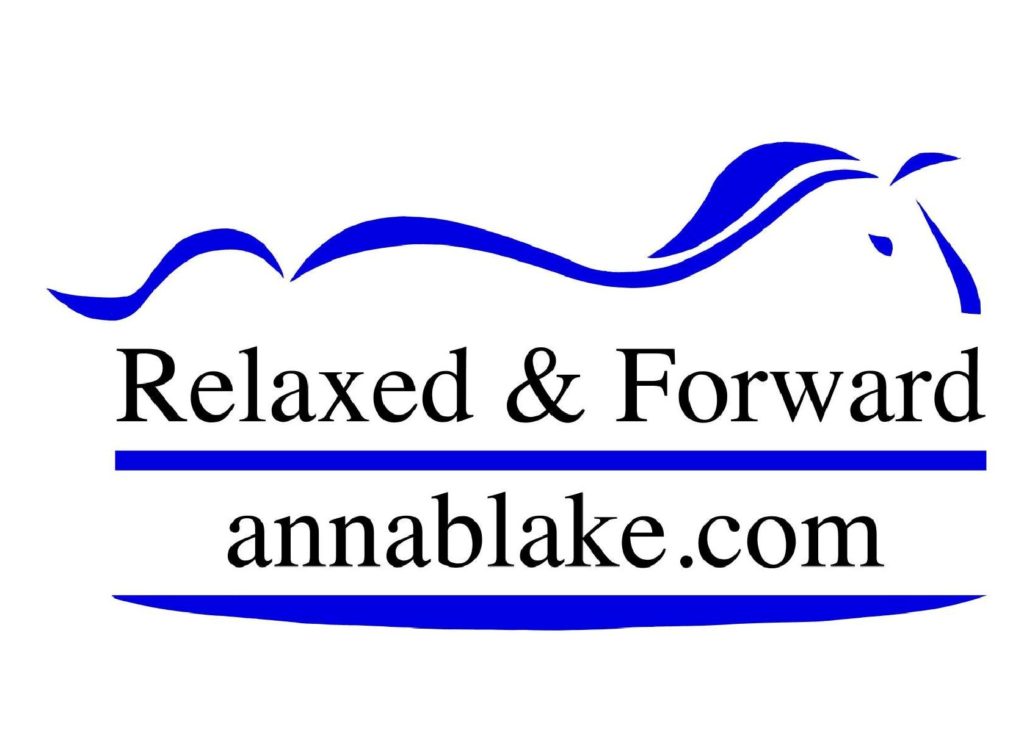
Because they’re doing construction down the road. His previous owner says he once spooked at a llama. The wind is blowing. There are strange sounds in the woods. The neighbor is mowing their lawn. There are kids playing just outside the arena. Motorcycles might go by. Dogs are barking behind the fence. The farrier was over there forging a shoe. It’s almost the Fourth of July. There are grocery bags blown against the fence. Horses die in lightning strikes, you know.
I swear, people are spookier than horses. Never mind that by the time we see or hear something, it’s been on the horse’s radar for a while, with little concern. We do like to look for problems. We react whether the horse does or not. And we’re smart to be aware of our surroundings.
Because we’re not entirely confident the horse is okay. Does he look off to you? That doesn’t touch all the possible health issues. EHV or DSLD or EGUS or DSP or IBD or EMS or dozens more and we learn three new ailments every week. No one knows the number of undiagnosable maladies and brain disorders possible. With global warming, there are more insect-borne diseases like WNV. For all their strength, horses are remarkably fragile. We must be vigilant because horses drop dead all the time.
If we get past all that, it’s time to do something of vital importance. We might be doctoring a wound, cleaning out hooves, or syringing wormer. It is all vital and must be done properly. And of course, there are training issues. Everything is of vital importance.
Our half of the equation: We know we might get hurt and fault ourselves for not being young and stupid. We want to be acknowledged for doing a good job but are self-critical instead. We know we’re being judged. Even if no one is in sight, that judgment is still immediate and cruel. We stare at our horse, a bright young prospect or a crippled old rescue, wishing we’d done a better job grooming them while worrying about the horrible things that might have happened to them in the past.
Best to not bring up the topic of the expense of horses, since most of us aren’t trust fund babies.
We just love horses. We are kind; we anticipate their needs. We study and listen to experts who contradict other experts and try to sort it out. We are half-drown in our own compassion for horses. Every detail matters and we insist on doing our absolute best every instant. Horses are a grand passion that we thrive on. Seeing our horse nibbling at some hay is enough to bring tears to our eyes. We know that horses feel our emotions and we love that about them, too. Even as we flood them.
People explain how much they love their horses and I listen. Theirs is a love mythical proportion, they explain because they are certain this thing they feel is unique. As if horse love is a rare thing that sets them apart from others. As if their heart horses, as we call them in quiet reverence, are a rare and exotic breed. As if horses have not ruled every day of my life.
It’s hard to not take ourselves too seriously, but love isn’t the question. What if we thought more about how horses receive it? Some of us had parents who criticized us constantly because of love. Feared for us because of love. Smothered us because of love.
Love is complicated, says anyone who has tried to hug a mare who thinks you’re a sap. She’s right. We do burn a little hot. A trainer I know calls it Aggressive Love. The mare has her own natural anxiety and now she’s giving you the side eye.
Your horse stands by as you worry there is something in the woods. Your anxiety piles on top of his natural anxiety; now he wonders what you are concerned about, too. The medication needs to be taken so we approach with a bit more anxiety that feels edgy to the horse. Our hands get stronger, we go faster for his own good. Bullied for love.
As a trainer, I’m lucky. My clients are never cruel. No one wants to dominate horses, we train affirmatively. We are more prone to dominate with love. As I listen to all our excuses about wind and other externals, I see calming signals horses give to us because we love hard. We stalk like wolves, we grab like mountain lions. Always with the best of intentions.
And horses read our intentions in our body language. Can they sense if our anxiety is about them or the weather? Are they resisting what we ask or how we ask? Is our kindness served with a dollop of anxiety on top?
There are two non-negotiables. Horses will always be horses. We will always love hard. I hope this never changes. And I hope most of all that my love isn’t a burden for my horse.
I could quiet my emotions, not that I care... Can I have that thrushy hoof, not that I care… Let’s go for a canter depart, not that I care... And those railbirds can sit and squawk, not that I care...
Sometimes horses mistake concern for doubt, as a child might when hearing adults talk about war. We hold our breath wondering about a friend’s horse with EPM and our horse goes quiet in his eye. We see a storm coming and think about colic. Any reasonable owner would, but our horse looks away. Horses seek safety and sometimes that means protecting them from our good intentions. As much as we want to control all the things out of our control, including our horses, we are doomed to fail. But we can monitor our thoughts around horses.
Not that I care… allows me to exhale a bit of anxiety. I will dull the edge of my love and open the door to the positive possibility that is also ours to claim. Because I do care more than a horse can bear.
…
Anna Blake, Relaxed & Forward
Want more? Become a “Barnie.” Subscribe to our online training group with affirmative demonstration videos, audio blogs, daily quotes, free participation in “group lessons”, and live chats with Anna. Become part of the most supportive group of like-minded horsepeople anywhere.
Anna teaches ongoing courses like Calming Signals, Affirmative Training, and more at The Barn School, as well as virtual clinics and our infamous Happy Hour. Everyone’s welcome.
Visit annablake.com to find archived blogs, purchase signed books, schedule a live consultation, subscribe for email delivery of this blog, or ask a question about the art and science of working with horses.
Affirmative training is the fine art of saying yes.

“As much as we want to control all the things out of our control, including our horses, we are doomed to fail.”
Deeeeeep breath, sloooow exhale, breathe and repeat.
God grant me the serenity to accept the things I cannot change, the courage to change the things I can and the horse sense to know the difference…..
Thanks Anna!
The art of letting go. Thanks Sueann
And shouldn’t we try to ” live in the moment” the best we can like horses do? Thinking about all the things that can and may happen to our horses only creates more anxiety and stress for us and our horses. With the on going ailments and happenings at my barn, I find my deep breaths are usually followed by my voice saying “one day at a time”
I agree entirely. We don’t notice that thinking isn’t being. Thanks Tiffany.
I of all people should understand. I get downright nasty when I feel overwhelmed by un-invited feelings and attention.
I should remember that. Than you, Anna, for the swift kick in the butt. I needed that. Exhale…
Joanna, your comment made me laugh out loud, we are so alike. Thanks. and Introverts Unite!
“Not that I care” I think I have a new mantra. My little horse, who worries and cares too much, will appreciate it.
Balance for him maybe? He is such a cool horse and being new to you makes it all the more… everything! Not that I care.
Thanks for your recent post. I am currently worrying about my gelding. I need to trailer him several hours away to a vet and I hate to trailer he doesn’t love it but its my fear. I am fearful of the trip, fearful of the diagnosis, and fearful of being fearful – what a load for my horse to deal with. Your article was a good reminder for me to breathe and be aware of how I am affecting my horse.
Thanks for sharing these thoughts, James. You might be right to feel this way but you are also right, your horse has stuff he’s dealing with or you wouldn’t be taking the trip. Keep breathing and best of luck.
Hope all goes well for you and your horse, James. Will be breathing on your behalf.
I just love reading others’ comments. And your responses, Anna.
Arent the comments great? The readers here are brilliant! Thanks, Julie
Nailed it. Per usual. Who wants their grand all-encompassing love to be a burden? No one. I finally figured out that it’s not that I care too much, it’s that I emote too much. Here’s all my feelings about you. You carry them. I’m exhausted. “Sure!”, says no horse on the planet, I’ll just stand here while you erupt love volcanically. I like “Not that I care”. Adding it to my stash. “Yep. I see your meltdown/spook/concern. Honestly? I think we’ve got this. But I’m here to help if you need me.” We want to control our horses emotions so they don’t meltdown/spook/react ( ok, I want to, “not that I care”) but really, I need to keep my own in check. Such a good reminder. Go, Anna!
Great word, emoting. Horses don’t act it out, but humans practically compete at it. That’s what I like about not that I care… it works for both of us. Thanks, Jane
I have found that a large dollop of humor and curiosity can tame the intensity dragon, whether it is the intensity of concern, or worry about something going wrong, or over-abundance of love, or a training moment that didn’t go as planned. Not that I care.
My young Luke horse loves to make me laugh, and I swear that he laughs when I laugh. Not that I care.
My senior mare Regine likes to snuffle my breath, very quiet and soft, and almost breaks my heart with softness. Not that I care.
When we laugh, we breathe. Its a human calming signal. Not that I care.
Thanks, Amber
yes and yes. so many things to worry about!!
not that i care.
my new refrain.
If we didn’t love them, could we tolerate them? Thanks, Chris
My one-eyed elderly reactive fjordhorse bjorn has enough dragons to fear without my emotional fear-based dragon jumping on his back. ‘Not that I care’
Yay for all the great warrior Fjords! Yay, Bjorn! Not that this smile at his old cantankerous self cares. Thanks, Ann
Not sure how I found this, but felt it hit home. I can’t explain the perfection of the timing. Thank you
Thank you, Laura, so glad.
👍very interesting, it resonates with me. I felt like you’re right here or I’m there, very nice. Thank you….not that you care🙏
Thanks, Suzanne. Yay, let’s say it’s you.